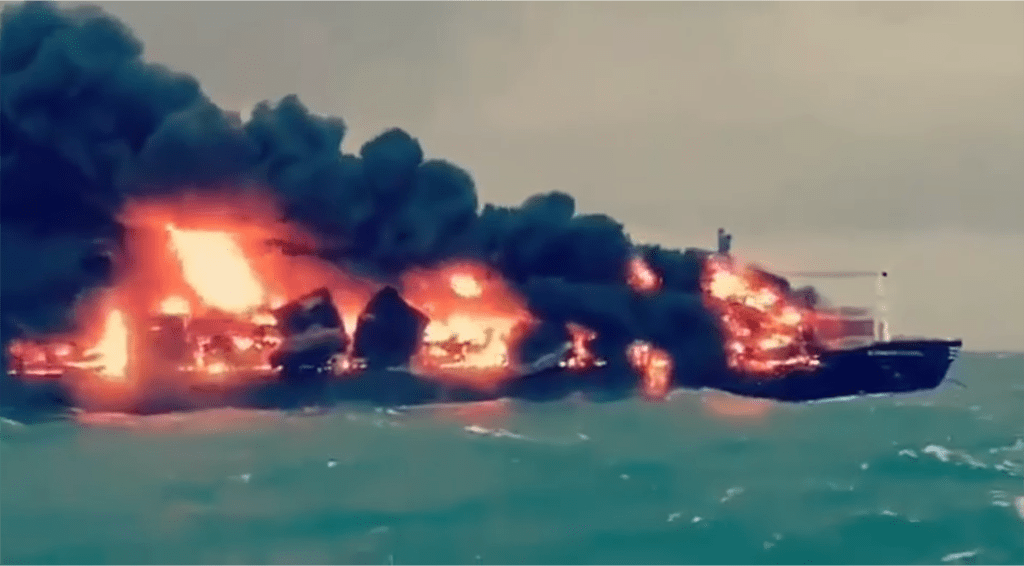
When the MV X-Press pearl was set on fire on the Sri Lanka coast in May 2021, few could predict the destruction scale, whether ecological or legal.
Now, four years later, the Sri Lankan Supreme Court has issued a prominent ruling that not only gives measures to measure responsibility, but also determines a history of how environmental negligence in maritime preparations.
On July 24, 2025, the court ordered the owners and operators of malicious ships, X-Press feeders in Singapore and related individuals to pay $ 1 billion in compensation to Sri Lanka.
This is to cover environmental damage, economic loss to fishing communities and continuous restoration efforts. This is one of the biggest maritime compensation awards in history.
An accident that shook the Indian Ocean
The MV X-Press Pearl, a container ship registered in Singapore, was on the way to Jebel Ali to Colombo when it was reported.
As soon as the Sri Lanka waters arrived on May 20, 2021, a fire occurred on the board – with dangerous cargo, including nitric acid and more than 70 billion plastic plastic (polyethylene pellets).
The environmental effects were urgent and terrible: the beaches covered by plastic bullets, the killing of sea species (417 turtles, 48 dolphins and at least 8 whales) and a devastating fishing industry due to government -imposed fishing banned in the western coastal area.
Legal Account: A prominent Supreme Court’s order
The ruling was the culmination of four basic basic laws (FR) (SC/FR 168, 176, 184 and 277/2021) registered by various stakeholders including the Center for Environmental Justice, Fishing Communities, Environmental Scientists and even Catholic Church.
Their charges were consistent: Sri Lankan authorities failed to act quickly or decisively to prevent disaster, and operators and representatives of the ship acted with negligence. The petitions sought long -term accountability and solutions, including compensation, ecosystem restoration, legal reforms and emergency mechanisms ..
The court received a court of MEPA and Criminal Investigations after a Marathon public hearing on the date of 30+ dated, including reports of the United Nations Environmental Program (UNEP), its MPA specialist committees, and criminal investigations:
- X-Press Pearl Operators and Representatives were responsible for the “original payment pollutants”.
- Government officials, especially MPA and the Sri Lankan port, were also criticized for lack of readiness and delay.
- This damage goes beyond environmental damage – this disrupted the livelihood, threatened biodiversity, and influenced public health and tourism.
Compensation and mechanism for refund
$ 1 billion to compensate for a multilateral response including:
- Paying to influenced fishing communities, which were among the hardest blows.
- Creating a Marine Environmental Protection and Protection Fund ..
- Forming a high -level commission and a technical committee to monitor the long -term ecosystem rehabilitation, management and transparency ..
The arbitration also calls for regulatory reforms, including updated standard operational procedures (SOPs) to handle dangerous cargoes, real -time accident report protocols, and coordination between stronger agencies, especially in marine emergencies.
Why is this important to world -renowned stakeholders and transportation
The verdict sends a strong message throughout the maritime world, because it is only about what happened in Sri Lanka, given the recent maritime disasters that have come to the industry.
This is more widely responsive that transport lines, charter, and port authorities must support them, especially in an age where ships have complex and high -risk cargoes on environmental -sensitive commercial routes.
Some important foods for the industry:
- Sufficient accuracy cannot be optional. Operators must ensure that the loads are transparent and correct, especially for dangerous goods ..
- Port and coastal states should be better prepared – with clear emergency response protocols and legal guidelines for intervention ..
- Prevention of pollution is now a company responsibility, not just a supervisory staff. Failure can lead to a crippling of financial consequences.
Look forward: Change in Marine Management
The X-Press pearl file may become a turning point in the use of original pollutants in the maritime law.
The Supreme Court of Sri Lanka has effectively stated that environmental negligence, whether deliberate or systemic, will have serious and tangible consequences, and repeats the message that the environment is now in line with the fundamental operational risk management.
If this ruling leads the industry to adopt higher standards, strengthen public and private cooperation and create flexible environmental protection, then some good things may still emerge from this devastating event.